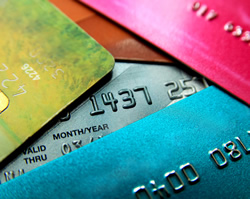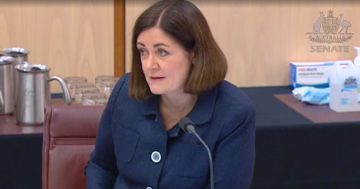Danika Miller* says people should take advantage of the pandemic restrictions to reduce their spending to pay off debt.
 The COVID-19 pandemic has officially ushered in an economic recession.
The COVID-19 pandemic has officially ushered in an economic recession.
When facing uncertainty about how the economy will recover, it’s essential to get your finances in order.
Does the word “debt” immediately come to mind? We understand. It’s probably your most stressful financial obligation.
High-interest debt, in particular, can keep you buried in bills that outlive the original purchase.
Surprisingly, according to the Experian Consumer Sentiment Index, average consumer credit card debt has actually decreased since January — plummeting card balances by 14 per cent.
And since nationwide lockdowns have downplayed spending, we think it’s time you take advantage of the coincidental saving and leeway from creditors, if you can.
Dedicate your energy to paying off debt so you can free up more money for an emergency fund.
- Contact your creditors and consider refinancing
Take a look at your various sources of debt, note your interest rates and reach out to lenders.
In these unprecedented times, many creditors are willing to offer their customers a break on repayment.
Plus, many banks are offering relief for customers in light of the current situation, including fee waivers, deferred payments and credit line increases.
There’s another silver lining.
Most interest rates are at a record low right now (especially for mortgages).
If your current lines of debt have a high interest rate you may consider refinancing for a lower rate and longer repayment timeline.
Adem Selita, CEO & Co-founder at the Debt Relief Company, says, “The key thing to understand is that during a recession, consumers have more power and leverage than they would otherwise.”
“What does this mean for consumers? It means you should reach out to your credit card companies directly and negotiate better repayment terms and better interest rates.”
“Since the odds of default are likely to increase during the recession, credit card companies are much more willing to work with you.”
Another way to lower your overall interest rate is to combine multiple debts into a single monthly payment via a debt consolidation loan.
- Strategise your repayment plan
Create a specific strategy for how you’ll pay off each debt (or how you’ll consolidate them).
Having a plan will keep you mindful of how you’re prioritising your money and increase your chances of success.
Selita offers a place to start: “People should always prioritise secured debts first, above anything else.”
“So make sure you’re taking care of your mortgage and auto loans. These debt obligations are secured by assets and are always the most important.”
Then tackle unsecured debts in order of interest rate.
One of the most common strategies for eliminating your debt is the snowball method — paying off the smaller debt first.
It’ll feel productive to knock out the easier debts, simplify your bills and build momentum to continue saving.
You can also try the reverse strategy called the avalanche method.
With this technique, you pay off your debts in order of interest rate, starting with the highest.
By tackling the highest interest rate first, you may save the most money over time.
Also keep in mind that with COVID-19 relief, some types of debt may not be incurring interest right now (like student loans.)
- Pay more than the payment due, if you can
The minimum amount that creditors charge you for each billing cycle is usually only a portion of the amount you owe and a percentage of interest.
If you only pay that amount, you’ll be paying quite a bit to have borrowed the money over an extended time.
If you can pay more than that minimum, you’ll pay off the loan faster and not spend as much on interest.
Be sure to specify that any amount more than the minimum due should only be applied to the principal.
This means that it goes toward your debt total, rather than future interest of fees (often the default).
This will help cut down on the interest you pay each time and shorten the lifetime of the loan.
- Trim down your spending
Probably the only upside of the pandemic — some people are saving more than ever.
With work-from-home and social distancing measures, many people are saving money on transportation costs and spending less on entertainment.
Overall, your discretionary spending is probably down right now — unless your vice is online shopping.
So, we’d encourage you to trim down your budget as much as possible.
Implement smaller changes that can have a significant impact like making coffee at home, skipping phone upgrades, downgrading your cable plan, cooking at home, cancelling subscriptions you don’t need or opting for the generic brands at the grocery store.
Leslie H. Tayne, a debt attorney, recommends thinking ahead and preventing future debt (especially with the holidays coming), “Look to pay down debt, but more importantly, try not to add to your debt.”
“This means making sure you have the requisite income to cover your expenses and that you’re not supplementing with credit cards or your overdraft account.”
“Right now is the best time to cut out unnecessary costs and decide really what is necessary and what is not.”
“Even if your cash flow is improving or you find that you’re not struggling, it’s an excellent time to re-evaluate, pay down debt (especially federal loans that have no interest right now), build an emergency fund, and have cash in the bank.”
- Find an extra source of income
Finding ways to earn more cash can help speed up the debt payment process.
Now that we’re all spending more time at home, maybe you’ve noticed you have more clutter than you need and want to free up space.
You can sell those items you don’t need any more at a garage sale or on sites like Facebook Marketplace, eBay and OfferUp.
You could also try taking on a side hustle.
If you choose something built around a skill or hobby you have, especially if it’s in-demand, you have a good chance of success.
Ben Reynolds, CEO and Founder at Sure Dividend, gave us some ideas, “Do some freelance writing for blog owners or start a bookkeeping business.”
“Sell your crafts on Etsy. This allows you to make money with a hobby you already do for fun.”
“Teach online lessons. If you play the guitar or speak Spanish, you can share your skill by Skype or Zoom.”
“Tutor students who need help with Algebra or Chemistry. If you know these subjects there are parents who are homeschooling who need you to help their teenagers.”
Picking up an extra job with a delivery service like Uber, Instacart or DoorDash is another practical option.
These companies have more work than ever and are pretty much always hiring.
It’s also usually a flexible job that you can manage during normal working hours or whenever you have free time.
Too long, didn’t read?
Developing a focused strategy for eliminating debt as we descend into economic certainty can help increase your financial stability.
Create a tight budget, choose an attack plan, pay more than you’re required and seek extra income.
Start by reaching out to creditors for any opportunities to waive fees or refinance your interest rates.
*Danika Miller is a writer at The Simple Dollar.
This article first appeared at thesimpledollar.com











